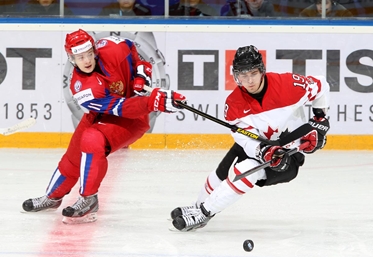Going for bronze
Going for bronze
Classic rivalry all set – but for third, not first

 Canada beat Russia, 4-1, on New Year's Eve. Today, they play for bronze. (Photo by Andre Ringuette/HHOF-IIHF Images)
Canada beat Russia, 4-1, on New Year's Eve. Today, they play for bronze. (Photo by Andre Ringuette/HHOF-IIHF Images)
This is a game both teams are desperate to win – and you don’t hear that too often about the third-place game, which can sometimes be an uninspiring affair.
To a man the Russians said after their semi-finals loss to Sweden that they just had to win the bronze. They couldn’t end the tournament by losing two in a row. They couldn’t disappoint the hometown fans who expected gold.
Canada has an incredible streak on the line. The nation has won a medal in each of the last 14 years. This team is desperate to make it 15. The players don’t want to be the ones to put a “4th” on the 2013 U20 line in the IIHF Guide & Record Book when above it for 14 lines are G, S, or B. Indeed, in the 31 years since Hockey Canada created its Program of Excellence, Canada has failed to reach the podium only five times.
Hopefully, with these two opposing ambitions colliding we’ll have an emotional game for third place. Emption was what made the New Year’s Eve game so exciting, and that’s the most important quality needed for the penultimate game of the tournament.
On December 31, Canada was victorious by a 4-1 score for several key reasons – and Russia lost for the opposite of those reasons. First, there was the major penalty and game misconduct to Valeri Nichushkin at 11:44 of the opening period.
Canada scored twice on the ensuing five-minute power play and took control of the game. As coach Mikhail Varnakov said after, it was a 1-1 game if you take that penalty out of the equation (Canada’s last goal was an empty netter).
Continue readingSecond, Canada got the puck deep and cycled brilliantly, getting to the puck first, moving continuously, not taking a lazy shift, moving and skating all the time. The Russians were flummoxed and out-hustled. They were on their heels, rarely moved the puck out of their end with ease, and generated few chances off the rush.
The Russians, when things don’t go well, always revert to solo dashes. The player who has the puck with speed through centre ice tries to go it alone, and Canada time after time stripped the skater off the puck with ease.
Coach Steve Spott will go with Jordan Binnington in goal. He played the last half of the semi-finals against the U.S. and was actually sensational, making many great saves off breakaways and close-in chances. It was a muted performance, though, because the game was well out of reach by the time he came in. Based on his play in that game, it’s too bad he didn’t get a chance to prove himself in the preliminary round.
Varnakov has used both his goalies, but Andrei Vasilevski started against Sweden and has played in four of six games. Both he and Andrei Makarov are capable, though, and goaltending has not been the problem for Russia in this event.
Canada’s captain, Ryan Nugent-Hopkins has to lead by example, and the players who were successful in last year’s bronze game – Jonathan Huberdeau and Boone Jenner – have to use that experience this year as well. Further, someone has to step up and play a big game at a big time. Perhaps it’s young Nathan MacKinnon or Jonathan Drouin or Mark Schiefele – or perhaps everyone has to play a disciplined and intelligent game as a team as happened with impressive wins against the Russians and, previously, the gold-game-bound Americans.
For the Russians, it would be good if their captain, Nail Yakupov, played like a leader or a superstar – or both. To say he has been underwhelming is being kind and polite. The first overall draft choice by Edmonton last year has but one goal in six games. He has done precious little on ice to demonstrate the enormous potential the Oilers thought they had acquired, and damaged his reputation off ice by refusing to come to the mixed zone for interviews. If anyone could use this game to resuscitate his reputation, it’s Russia’s number 10.
The story lines are many. Yes, the rivalry is there, but usually these teams play for gold. Other factors must kick in if the bronze game will have as much drama. The word “champion” will not be uttered after this game, but “bronze winner” sounds so much better than “fourth place”. Let’s see who cares more.
Back to Overview





















































